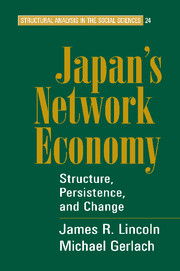Book contents
- Frontmatter
- Contents
- List of Figures
- List of Tables
- Acknowledgments
- Introduction
- 1 The Structural Analysis of the Network Economy
- 2 The Origins of Japanese Network Structures
- 3 The Evolution of a Corporate Network: A Longitudinal Network Analysis of 259 Large Firms
- 4 Exchange and Control: Explaining Corporate Ties: A Longitudinal Dyad Analysis
- 5 Intervention and Redistribution: How Keiretsu Networks Shape Corporate Performance
- 6 Japan's Next-Generation Industrial Architecture
- Bibliography
- Index
2 - The Origins of Japanese Network Structures
Published online by Cambridge University Press: 05 April 2010
- Frontmatter
- Contents
- List of Figures
- List of Tables
- Acknowledgments
- Introduction
- 1 The Structural Analysis of the Network Economy
- 2 The Origins of Japanese Network Structures
- 3 The Evolution of a Corporate Network: A Longitudinal Network Analysis of 259 Large Firms
- 4 Exchange and Control: Explaining Corporate Ties: A Longitudinal Dyad Analysis
- 5 Intervention and Redistribution: How Keiretsu Networks Shape Corporate Performance
- 6 Japan's Next-Generation Industrial Architecture
- Bibliography
- Index
Summary
The organization of Japanese and Western industry was probably more similar in 1910 than in 1970.
Rodney Clark, 1979:258Introduction
As the first non-Western country to industrialize, Japan is an important test case for alternative models of economic development. While knowledgeable observers may disagree on the specifics, most will concur with the premise that Japan's development was not simply the product of convergent modernization — its economic, political, and social institutions reflect distinctive features of Japan's own history, not merely the re-creation of their Western counterparts. Indeed, as Clark suggests in the introductory quote, the general trend through much of this century may have been toward divergence away from Western (or at least American) assumptions about how development takes place.
This chapter considers the issue of Japan's economic development from an institutionally informed network perspective by exploring the organizational and industrial arrangements that have underpinned it. Our methodology, unlike the quantitative analyses in chapters to follow, is qualitative and historical, covering a period of roughly a century from the early years of Japan's modernization in the late 1800s to the miracle years of the 1950s to 1980s. Our treatment is focused and analytical rather than exhaustive and descriptive. A few underlying principles explain much of what we see today, even if the specifics have varied by time period, industry, and company.
We divide the evolution of Japanese network organization into three phases of development.
- Type
- Chapter
- Information
- Japan's Network EconomyStructure, Persistence, and Change, pp. 51 - 86Publisher: Cambridge University PressPrint publication year: 2004

